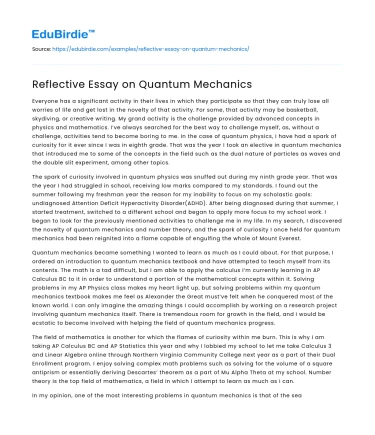Everyone has a significant activity in their lives in which they participate so that they can truly lose all worries of life and get lost in the novelty of that activity. For some, that activity may be basketball, skydiving, or creative writing. My grand activity is the challenge provided by advanced concepts in physics and mathematics. I’ve always searched for the best way to challenge myself, as, without a challenge, activities tend to become boring to me. In the case of quantum physics, I have had a spark of curiosity for it ever since I was in eighth grade. That was the year I took an elective in quantum mechanics that introduced me to some of the concepts in the field such as the dual nature of particles as waves and the double slit experiment, among other topics.
The spark of curiosity involved in quantum physics was snuffed out during my ninth grade year. That was the year I had struggled in school, receiving low marks compared to my standards. I found out the summer following my freshman year the reason for my inability to focus on my scholastic goals: undiagnosed Attention Deficit Hyperactivity Disorder(ADHD). After being diagnosed during that summer, I started treatment, switched to a different school and began to apply more focus to my school work. I began to look for the previously mentioned activities to challenge me in my life. In my search, I discovered the novelty of quantum mechanics and number theory, and the spark of curiosity I once held for quantum mechanics had been reignited into a flame capable of engulfing the whole of Mount Everest.
Save your time!
We can take care of your essay
- Proper editing and formatting
- Free revision, title page, and bibliography
- Flexible prices and money-back guarantee
Quantum mechanics became something I wanted to learn as much as I could about. For that purpose, I ordered an introduction to quantum mechanics textbook and have attempted to teach myself from its contents. The math is a tad difficult, but I am able to apply the calculus I’m currently learning in AP Calculus BC to it in order to understand a portion of the mathematical concepts within it. Solving problems in my AP Physics class makes my heart light up, but solving problems within my quantum mechanics textbook makes me feel as Alexander the Great must’ve felt when he conquered most of the known world. I can only imagine the amazing things I could accomplish by working on a research project involving quantum mechanics itself. There is tremendous room for growth in the field, and I would be ecstatic to become involved with helping the field of quantum mechanics progress.
The field of mathematics is another for which the flames of curiosity within me burn. This is why I am taking AP Calculus BC and AP Statistics this year and why I lobbied my school to let me take Calculus 3 and Linear Algebra online through Northern Virginia Community College next year as a part of their Dual Enrollment program. I enjoy solving complex math problems such as solving for the volume of a square antiprism or essentially deriving Descartes’ theorem as a part of Mu Alpha Theta at my school. Number theory is the top field of mathematics, a field in which I attempt to learn as much as I can.
In my opinion, one of the most interesting problems in quantum mechanics is that of the search for a theory to connect quantum mechanics and general relativity. Whether it is string theory, loop quantum gravity, or another theory yet to be postulated, a proof would be a substantial advancement for the field of quantum mechanics. I enjoy learning about, and hopefully one day solving, advanced theoretical concepts in the area of quantum mechanics. Other problems within the field are similarly intriguing, but I believe that a theory to unify these two theories would tie everything together and lead to other potential advancements. I hope to be able to contribute to this grand unifying theory, or at least to the revolutions that come as a result of it.
In my opinion, one of the most interesting questions in number theory is the Riemann hypothesis. The Riemann hypothesis is a conjecture which states that the non-trivial zeros of the Riemann zeta function are comprised of an infinite number of complex numbers with a real component of .5. The Riemann zeta function is a function designed to analytically solve for the sum of the infinite series of n to the s, where n is an integer starting at 1 and incrementing by 1 to infinity, and s is a complex number consisting of a real part and an imaginary part. If someone were to find a way to solve for the non-trivial zeros of the Riemann zeta function, that formula could be used to lead some insight into the elusive distribution of the prime numbers. Since encryption software relies heavily on the prime numbers, a solution to the Riemann hypothesis would revolutionize the field of cryptography as we know it. I enjoy watching online lectures relating to the Riemann hypothesis and would love to have a chance to solve the conjecture at some point in the future.






 Stuck on your essay?
Stuck on your essay?

